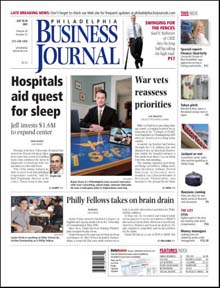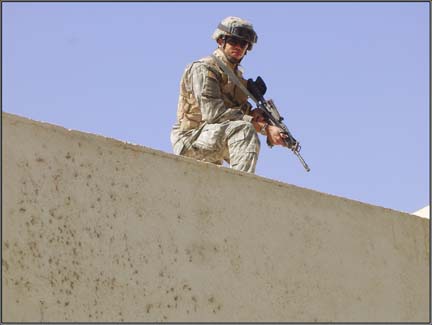War Veterans Reassess Their Priorities.
Young veterans are returning from Iraq and Afghanistan and taking positions in the corporate world.
Published on July 20, 2007 in the Philadelphia Business Journal.


Mike Lui had been assessing damage inside an insurgent-bombed civilian hospital in the "Triangle of Death" near Baghdad on Thanksgiving 2005 when he heard a screeching noise outside.
A suicide car bomber had broken through the U.S. military line and slammed into an American Humvee just outside the hospital entrance, a few yards from where Lui, an Army Reservist, was standing.
The ensuing explosion sent shrapnel flying everywhere, killing more than two-dozen civilians. Several American servicemen were wounded.
Lui, a 26-year old native of Northeast Philadelphia, was knocked to the ground by the blast. Shards of metal cut through his pants but his injuries were minor.
"It was just dumb luck," said Lui, who is now back in Philadelphia, working as a management consultant for Deloitte Consulting LLP.
Three soldiers who had been standing behind him were seriously injured and later awarded the Purple Heart for their service.
Lui spent more than a year in Iraq in the civil affairs unit, working with locals to help rebuild the country. He regularly met with tribal leaders to establish relationships and learn about the needs of residents. His job there, he said, was similar to his job here - solving clients' complex problems efficiently and effectively.
While the majority of the military who have fought in recent operations in Afghanistan and Iraq come from working class backgrounds, there are numerous servicemen and women from the professional world - bankers, lawyers, doctors, accountants, etc. - including many from the Greater Philadelphia region.
Those who go to war and then return to the corporate world often bring back a different appreciation for business, a changed sense of priorities, and a deeper understanding of people and cultures, veterans and experts said.
"The drive is still there but it impacts in certain ways," said Lui, who was shipped to Iraq in May 2005, about one year after joining Deloitte. "Everybody does something for a job but my job doesn't make up my identity."
Robin Roberts, 29, a former captain in the 173rd Airborne Division, said that nothing will ever seem difficult to him now compared to the long hours and arduous work he did while in Afghanistan for one year. He spent most of his time rebuilding structures, repairing military vehicles and performing routine patrols.
"In an atmosphere where all you do is work, you'd be amazed at the level of commitment you see," said Roberts, now a financial advisor with Independence Financial Associates in Conshohocken.
He said that there were no signs of technology anywhere in Afghanistan except for what the Russians left behind and what the coalition forces brought. Most areas did not have running water and many of the local men suffered from gonorrhea. His base was rocketed several times.
"People say they're having a bad day here?" said Roberts, a Germantown Academy graduate and the grandson of the Phillies Hall of Fame pitcher of the same name. "They don't know what a bad day is."
His service doesn't come up often during meetings with clients. Occasionally, he meets someone who tells him that they were in the military, or that their children or grandchildren are now in the service. He keeps his past to himself unless he sees a way to make a connection - the bonds among those who serve is strong.
"They're not buying the product," Roberts said. "They're buying you."
Approximately 17,000 active duty servicemen and women transition out of the military every month. These people offer potential employers valuable skills learned under intense conditions, said Bryan Dunn, a former Army captain who now helps young veterans find leadership-level employment.
"The average 26 year-old hasn't been in charge of 50 people and $20 million worth of high-tech equipment like we have," he said. "We can make an immediate positive impact."
A 31-year-old from Oaklyn, New Jersey, Dunn flew Chinook helicopters as part of the second wave of troops to arrive in Afghanistan in 2002. He was in the first wave entering Iraq in 2003.
While staging for operations in Kuwait just prior to the Iraq invasion, Dunn's unit was barraged by a massive sandstorm with 80 mile-per-hour winds. Embedded journalists took shelter in Dunn's tent, and he was quoted on the front page of the New York Times the next day.
"It was pretty cool," he said. "I hadn't spoken to my family since coming to the Middle East and this is how they learned about me."
The things he experienced in Afghanistan have stayed with him. Mortar shells and grenades were lobbed into the military camp daily. Local men would rummage through the mess hall trash for food. The stark countryside in the foothills of the Himalayas looked like the moon, Dunn said. He would fly for hours at night without seeing a single electric light. As the sun rose, he would find families sleeping on rooftops.
"It was like flying through the Bible 2000 years ago," he said.
When he returned from war, he used Soar Consulting to find a job. Soar is a non-government organization that places recent veterans in jobs. During the process of job hunting, Soar hired Dunn to work in the Philadelphia region as an account executive.
"No one tells a 23 year-old six months out of college to go out and execute national policy except the military," Dunn said. "Not everything we do in the military is translatable to civilian life but you can always translate leadership."
Former Army captain Jorge Pena, 28, said that veterans bring dedication and perseverance to their post-military employment.
"There's a clear distinction between junior military officers and the civilian workforce," he said. "There's a level of commitment that those who didn't serve don't understand."
Pena served 5 years of active duty, including one year as an artillery officer in Iraq's Sunni Triangle. He's now a salesman for Barrier Therapeutics in New Jersey.
"Sometimes they're a little too dedicated to their work," said Turpin Mott, a Desert Storm veteran who now works with the Return to Honor workshop, a veteran reintegration program sponsored by the Valley Forge-based Freedoms Foundation.
Mott said that the return to civilian life is difficult for many veterans, especially for those who served during times of war. The lives of loved ones continued while the servicemen were away. Friends established other relationships. Clients worked with other consultants. And few people can relate to what the vets witnessed in war.
Some vets throw themselves into their work, as that is how they were trained in the military. Others retreat from the world.
Mott said that many recent vets find themselves asking, "Is what I'm doing in the corporate world working, or do I need to step out and do what's best for me and my family?"
For many vets, it is impossible to simply pick up their life that existed before their service.
"Everybody going to Iraq or Afghanistan has some sort of stress or trauma," said retired Major General Wesley Craig. "It's a big change to say the least."
Craig now works with returning vets to find jobs and assimilate back into civilian life.
Mike Lui jumped right back into his work after returning from Iraq. He's traveled across the country and spent several weeks in China consulting for Deloitte. His service, he said, has made him a more valuable employee.
"Updating a battalion commander in a forward combat zone isn't all that different from doing a presentation to a steering committee," Lui said. "Except the committee members aren't packing weapons and wearing fatigues."
He now reacts better under pressure, he said. He has a greater understanding of what leadership entails. And where he used to lose patience with people, he now has more tolerance.
"I don't really get stressed out anymore," he said with a laugh.
Lui's laptop computer is full of images from his time in Iraq. He has pictures of the two-foot deep crater created by the suicide bomber at the hospital. There are images of stoic soldiers with automatic weapons wearing camouflage and body armor. There are images of barren base camps and drab-looking residential rooms.
But the image that Lui, a 1998 Central High School graduate, is most proud of is the one that features smiling Iraqi children waving Iraqi flags, jumping up and down in bare feet.
Part of the civil affairs unit's duties was to visit schools and drop off supplies like coloring books and crayons. It was feel-good mission work and the soldiers often spent time with the children, making friends, offering toys and stuffed-animals, building trust among the young.
"Let's be the guys who aren't aggressive," Lui said of his strategy upon arriving in Iraq. "Let's be the guys who are polite. Let's make every touch point positive."
Still, Lui said that his unit was attacked regularly.
"We could drive down the same road ten times and the 11th time, we'd get hit," he said. "We weren't looking for trouble but once you put on that uniform, you're in trouble. It's amazing how incredibly frustrating everything was. I wasn't there to kill or hurt anybody."
Lui detailed his experiences in weekly e-mails that he mass mailed to family and friends, including clients.
When new clients learn that Lui served in Iraq, it builds an instant air of credibility, he said. There is a feeling of trust, especially among senior executives.
"At first they are surprised - I don't think I fit the typical description of someone who joins the military," said Lui, a tall, thin, Chinese-American who holds a business degree from Penn State University. "Then we'll have a two-hour discussion on the Middle East."
He said that he doesn't wear his service on his sleeve but when the topic comes up, people are very curious about his experiences. And rather than get into a debate about the merits of the war, Lui talks about the plight of the Iraqi citizens.
"I haven't seen that amount of suffering before," Lui said. "I need to figure out a way to alleviate some of that suffering. I'm still trying to find something that doesn't feel like a Band-Aid."
With another full-year of reserve duty remaining, Lui could be sent back to Iraq if needed.
"My phone could ring any day," he said.





